:: Austin City Limits :: :: Zilker Park :: October 8 - 10, 2010 ::
Words and photos by Matt Treon
“This is one of the best festivals in the whole fucking world.” – Wayne Coyne of The Flaming Lips
Austin City Limits Music Festival, put on by C3 Presents, succeeded again this year in turning the Texas capital into a three-day music Mecca — 134 bands and 75,000 fans showed up for a weekend of live music on eight stages.
Great music festivals always feel hyper-real inside the gates: the bands seem better, the fans seem louder, and the beer seems tastier (or at least more expensive, so you try and tell yourself that it does), and from the second the Star Wars theme song blasted from the festival grounds as the gates opened each morning (an ACL tradition), 46 acres of Austin’s Zilker Park were transformed into a larger-than-life pastoral setting for scores of great music, tons of beer drinking, and the occasional abandoned article of clothing strewn about.
It’s been said that “writing about music is like dancing about architecture” (this quote of arguable origins has been attributed to everyone from Miles Davis to Elvis Costello to Frank Zappa), and while I can’t say I agree with sentiment, I get the idea—my writing about ACL 2010 can’t possibly serve as a substitute for being there, and these typed words can’t be transformed into music. But, I think the fact that people still love reading about live music has a lot to do with the reason people pay money, and drive long distances to go see bands play instead of just listening to them on the stereo — there’s so much more to music, especially live music, than just sound. So, as a huge fan of so many bands that played ACL this year, I will not be able to help myself from commenting on all my favorite songs that were played, etc., but I will certainly do my best to explore all the special, noteworthy elements of spending three days (a collective 33 hours of actual live music!) being straight inundated with sights and sounds from so many musicians coming from all over the world, playing in an infinite amount of varied styles, and bringing so many different aspects of culture and history with them. And what it’s like for a fan to take it all in while desperately trying to not spill the $7 beer in one hand, or drop the expensive borrowed camera in the other.
Headliners
When the official ACL schedule was released (months after the festival had already sold-out), the first look was at the chosen headliners, and hard decisions had to be made.
Day 1 Headliners: The Strokes/Phish. In the end it seemed a little funny for me to drive 947.52 miles from a city like Boulder, CO to a city like Austin, TX to watch Phish play, so…
The Strokes
Friday night ended with a well thought-out split of musical tastes and styles (and, ipso facto, the crowd): the jam-band superheroes Phish on one side of the park, and the New York rock revivalists The Strokes on the other.
The Strokes are easily one of the biggest music phenomenons of the last decade — if for no other reason than the fact that their music and their abounding world fame can cause an argument like nobody’s business; for as many fans as they have, there seems to be just as many people who want to write the success of their first album, and subsequent fame, off as a fluke. And The Strokes, or at least front man and songwriter Julian Casablancas, seemed to be aware of this throughout their show. Evidence for this fact transpired slowly. And it started with the first song of their set: “Is This It.” The song was a perfect choice for an opener — it brought the audience right in with its undeniable hooks, it’s short and so sweet, and is a great song to sing along to. But the interesting fact, that can’t simply be a coincidence (further evidence of this fact still to come), is that the song is also the first track of The Strokes’ first album (i.e., the album the band’s almost overnight stardom rooted from). And it was on from there. Bouncing from album to album, the band — accompanied by a minimal but impressive light show — ripped through the hardest hitting songs from their catalog. Casablancas’ voice easily flowed from his signature Lou Reed-esque crooning to his short explosive, soulful growling. Fabrizio Moretti’s drumming was machine-like in its precision, with Nikolai Fraiture’s bass locked in every step of the way. The guitars (Albert Hammond, Jr., Nick Valensi) were spot on, crossing paths with each other in the distinctively rhythmic manner that plays a huge role in defining The Strokes’ sound. The band was tight, energetic, and… funny.
Between songs, Casablancas engaged the eager crowd with witty (if not slightly drunken) banter. And this is partly where it goes back to the self-aware aspect to the set. At one point, Casablancas began looking around at the festival grounds, talking about how cool he thinks the ACL festival is, only to then say, “But I can’t see shit because like an asshole I wear sunglass at night.” This garnered a large laugh from the crowd. And at another point — in what seemed like a very genuinely impromptu moment — Casablancas even led the audience in a sing-along to the theme song to the 80’s TV hit ThunderCats. It was a wonderfully nostalgic moment for anyone in the audience who grew up watching ThunderCats in front of a daycare television set; judging by the enthusiastic collective “Ho!” that came from the audience after Casablancas yelled out “Thundercats,” I surely wasn’t the only one there who wielded Lion-O’s light-up Sword of Omens on many a playground, acquiring “sight beyond sight,” as a kid. But the possible tongue-in-cheek quality of this being how many people wrote off The Strokes as being nothing but a flash in the pan, garage rock nostalgia act calling up their NYC predecessors The New York Dolls, Television, Ramones, et al. They obviously love the things they grew up with, be it rock bands or morning cartoons, but doesn’t mean they can just be reduced to their influences. The commentary even went as far as to be self-reflexive of rock and roll itself. After the band played “New York City Cops” (one of the band’s heaviest songs, written about their perceived incompetence of the NYPD, that was removed from Is This It because the album was slated to hit U.S. shelves on Sept. 25, 2001, and, coming so soon after the 9/11 attacks, the band felt it would be inappropriate timing), a few members sort of shuffled to the side of the stage to grab a beer, while Casablancas lingered, saying, “You go off stage, you do the fake encore, [expletive]that, we’re just going to keep playing.” Then they played “Vision of Division,” from their 2005 album; Between Love & Hate, from their 2003 album; and closed the night out with “Take it or Leave It”— not only a slight nod to what could be perceived as Casablancas almost saying, “We’ve been here a decade now, we are who we are, like us or don’t, and move on,” but also the final track of The Strokes debut album (aforementioned “further evidence”), creating a nice bookend with the set’s opener.
After an extended hiatus, a few solo albums, and a run through the rumor mill, The Strokes’ high energy ACL show certainly made it seem like they’re ready to go back into the studio later this year, and come back out swinging and swaggering the way they did almost 10 years ago. But beyond all the postulations about the possible subtext of their show, one thing was undeniable: The Strokes put on a hell of a rock show. Any fan was surely pleased. And any non-fan was probably already over watching Phish, anyway.
Day 2 Headliners: Muse/M.I.A. I mean this as no slight to M.I.A., I would have loved to have caught her show, but… well, Muse was playing.
Muse
Saturday night closed with who was quite possibly the most anticipated band of the weekend, Muse. Near the front of the stage, about half an hour before Muse’s set, a security guard leaned an ear into his walkie-talkie, then turned to me, making small talk, and said, “Apparently there are lots of people trying to jump the festival fences right now. We haven’t had a problem with that all weekend… until now.”
The band walked on stage and immediately launched into the lead single (“Uprising”) off their latest album, The Resistance. They were backed by a visual fusion of lasers, LED’s, and projected video images of the Orwellian variety. All in all, if Oliver Stone ever directed a silent adaptation of 1984, and had Muse provide the soundtrack, the show was about what that would be like.
After “Uprising,” Muse proceeded to rock through a raucous set full of fan favorites. They didn’t play anything off of their first album, Showbiz, but their other four albums got equal treatment. And, whether the band was playing a hit single or not, the fans didn’t let up for a second; singing along, singing loudly, and with fist, feet, and other body parts in the air, the fever pitch level of the crowd lasted from start to finish.
Matthew Bellamy also had no shortage of toys on stage. By the time it was all said and done, he’d broken out his usual array of custom guitars (Bellamy designs many of his own guitars, along with Hugh Manson of Manson Guitars; his most commonly used silver guitar is named “DeLorean”), equipped with Kaoss Pads; a double neck guitar, which at points he used to play both necks, simultaneously; a keytar; and a fully gyrating guitar amp, which he spun around to create a Doppler effect, much in the manner of a manual Leslie speaker. Drummer Dominic Howard even got to have a little fun when he went front and center, playing a set of light-up toms during “Undisclosed Desires.”
Several other moments worth highlighting: various short interludes stemming from riff-oriented jams as heavy and groovy as any Led Zeppelin jam could be, to a quick run through the chords of “House of the Rising Sun,” with the audience singing through a verse without being prompted, to Bellamy tremolo-picking an awesome variation of “The Star-Spangled Banner.” And while the crowd went wild over his playing the American national anthem, it was quite possibly a bit of jesting irony on Bellamy’s part seeing as how Muse is an English band, and the lyrics of “The Star-Spangled Banner,” penned by Francis Scott Key, are set to the tune of an English drinking song titled “The Anacreontic Song”— the official song of the Anacreontic Society, an 18th-century gentlemen’s club of musicians in London. Bassist, Christopher Wolstenhome, also offered up a nice surprise when he launched into an ominous harmonica intro to start the final song of the night, “Knights of Cydonia.” And in the same second the band kicked into the number, a barrage of giant inflatable eyeballs flew into the air from either side of the stage, and six minutes of pure mayhem ensued.
Day 3 Headliner: Eagles
Adding to the impressive list of rock legends that line ACL’s history (2005: The Allman Brothers Band, Oasis; 2006: Tom Petty, Van Morrison, Willie Nelson; 2007: Bob Dylan; 2008: Robert Plant (w/ Allison Krauss); 2009: Pearl Jam), the festival concluded Sunday night with the Eagles. But from the moment it was announced, back in May, that the Eagles would be headlining the festival, the idea of just adding yet another rock music legend, well past the apex of their career, to the ranks of the festival’s résumé is exactly where the criticism drew from. Many people felt it was a safe, nostalgic pick. And while there is no denying that the Eagles are exactly that — everyone knows who they are and knows at least one song by them, most people like them, and hardly anyone could really complain about them being there — the critics need not jump up too eagerly. Because when it comes down to it, the Eagles have been playing together since 1971, and can still put on a great show. Which is exactly what they did this year at ACL.
It might have seemed like an underwhelming show in comparison to last year’s closer, Pearl Jam. PJ, not at all wet behind the ears themselves, put on one of the loudest, most rocking and energetic shows of the festival. And anyone hoping for the same level of climax this year was surely disappointed. But, if looked at from a different angle, the Eagles were a great choice for a closing act. While they didn’t keep fans jumping and screaming along with them until the last seconds of the festival, they did, however, do just the opposite. Which is not to say they at all played a boring or uninterested show, but, instead, provided the perfect backdrop for unwinding after three days of jumping up and down and screaming (and lying in the sun, and drinking lots of beer, and crowd surfing, etc.). Their fifth song perfectly summed it up; it was a “Peaceful Easy Feeling.”
Not wasting anytime, they launched right into the hits (Eagles album Their Greatest Hits (1971-1975), having sold 29 million copies, is tied with Michael Jackson’s Thriller as the best-selling album in the United States). And they didn’t just play Eagles hits, but each other’s solo hits from over the years, as well. Playing a two song encore, they closed the set with “Desperado”— the park aglow with cell phone screens waving back and forth, as thousands of people, spanning several generations, sang along. Their trademark four-part vocal harmonies were as tight as ever. And their show was as professional as it gets. Near the middle of the show, Glenn Frey took a minute to introduce the members of the band — who obviously needed no introduction — and after naming Don Henley and Timothy Schmit, Frey turned to his left and said, “And a man known by authorities and hotel management all over the country, Joe Walsh,” receiving one of the biggest round of applause of the weekend.
Other Notable Acts Throughout the Weekend
While the headliners often play a large role in defining how each year of ACL is remembered, with 129 other bands playing, by no means are the headliners the only game in town.
The Flaming Lips
There were enough lights, balloons, and toys on The Flaming Lips’ stage before their set to make any Lips fan salivate waiting for the show to start. Then Lips mastermind Wayne Coyne stepped out on to the stage. But instead of anything along the lines of “Hello Austin! How you feelin tonight?” he instead announced, “I’m going to come out in my space bubble.” Immediate applause. Then he said, in classic Coyne style, “But let’s not rush the stage… We’ll love each other, and help each other.” Then the experience that is a Flaming Lips show was on, and in full-effect.
As the band launched into the first song of the set, Coyne traversed the massive crowd in his space bubble. Then, within three songs, he’d already escaped the space bubble, sang through a megaphone as it expelled pink smoke, launched off a dozen confetti blasts, danced around with a bunch of people in weird orange jumpsuits, and sang atop the shoulders of a very tall person in a bear suit (and a very awesome bear suit at that). Again, that was only the first three songs. That’s a Flaming Lips show in full-effect.
Playing through mostly new material, the Lips kept their audience entranced for an hour. Halfway through the set, Coyne led the crowd through a sort of Wayne Says game where he got thousands of people to act like a motorcycle, frog, lion, bumblebee, warrior, monkey, tornado, helicopter, and even a sneeze. All the while, the blissful psychedelic rock continued behind him. The Lips closed out their set with a moving performance of their anthemic “Do You Realize??” (In 2009, the song was adopted as the Official Rock Song of Oklahoma).
The Black Keys
At 4:00 on Friday afternoon, Dan Auerbach and Patrick Carney, who comprise Ohio rooted, blues-rock based The Black Keys, came out to one of the most enthusiastic crowds of the weekend. To call The Black Keys a blues-rock based band is actually an oversimplification, and too easy. While it would aptly describe the heart of the band’s fuzzy, distorted, groove-centered sound, they can move everywhere between blues-rock, metal (on the vintage Kinks/Steppenwolf, “origins” side of the metal spectrum), country twang, funk, or soul. And even that list of descriptors doesn’t quite do the band’s myriad of stylistic influences justice. That’s part of what is great about The Black Keys, though: they immediately sound like something you’ve heard a hundred times before, and are familiar with, but can’t exactly put your finger on—and that’s a lot of what keeps you listening. The other part of what’s great about The Black Keys: for being a two-piece band made of drums, guitar, and vocals, they can rock! Their set was a sixty-minute, two-man bit of agitated euphoria, matched only by the roar of their crowd.
Spoon
Spoon, the paragon of a solid indie-rock band, played a Friday evening slot wedged between The Black Keys and The Strokes, and held their own with no problem. Playing on a stage adorned with strings of bare light bulbs, and occasionally backed by a horn section, Spoon mixed it up with old and new material. The always-engrossing Britt Daniel (vocals, guitar) often seemed to be exorcising emotions — spitting out lyrics, stomping on the ground, attacking the strings of his guitar — as much as he seemed to be singing or playing. Much to the audience’s delight, Daniel kept laughing during and between songs while interacting with fans. At one point he fell away from the microphone laughing, leaned back in and said, “No, I will not take my top off.” Eleanor Friedberger of indie-rock duo The Fiery Furnaces joined the band onstage to sing one song with Britt. Friedberger is from Illinois, but she sported a t-shirt onstage that read, “Texas has it All.”
Edward Sharpe and the Magnetic Zeros
After playing backstage for a live radio broadcast, Edward Sharpe and the Magnetic Zeros went out to play their late afternoon show proper. With the setting sun beaming through a backdrop of a painting of the yellow brick road leading to a distant Emerald City, the band of ten-plus members flooded the stage in a manner that surely brought back memories for any fan of the Polyphonic Spree (minus the matching robes) as front man Alex Ebert ran straight across the stage, through the photo pit, jumped up on the side-stage monitors (where he sang from for most of the set), and walked across the railing in front of the enthusiastic crowd, standing over them, holding hands with them, singing the whole time. The almost messianic performance from Ebert fit perfectly with the idea of Edward Sharpe — Ebert’s made up character (and borderline alter ego) who, according to Ebert, was sent to earth to heal and save mankind, but is too easily distracted by girls, and falling in love with them. The band played a fervent show from start to finish, and it was equal parts rock concert and holy tent revival. They closed their set with the hit song, the instantly catchy and nearly unavoidable sing-a-long “Home.”
Gogol Bordello
Three things anyone attending a show put on by NYC’s Gypsy punk rockers Gogol Bordello should know: (1) if you’re standing near the front, singer Eugene Hütz will probably throw red wine on you, (2) if you’re standing near the back, crazy fans doing variations of Russian dances will probably trample you, and (3) if you’re standing in the middle of the crowd, you’ll definitely be ducking an onslaught of pumping fists the entire show. Gogol Bordello, much like the Flaming Lips, put on an experience more so than just a rock concert. With a multitude of members (all of whom seemed to be sharing various parts of a whole Che Guevara costume) running almost non-stop around the stage, standing on monitors, constantly engaging the crowd to do more than just listen, the show brought many people out of the day-two-late-afternoon-lull, and injected a lively pulse back into the heart of anyone in proximity of their stage.
Manchester Orchestra
With the city of Manchester being the old stomping grounds for bands such as Oasis, The Smiths, New Order, Joy Division, et al, one can assume that the name Manchester Orchestra is a shout-out to the band’s collective influences (the band is from Atlanta, Georgia), but there is definitely something special about MO that raises them above simply being the sum of their influences. Playing a set comprised mainly of material from their latest LP Mean Everything to Nothing, Manchester Orchestra, led by the bearded and black clad front man Andy Hull, tore through a noteworthy rock show on par with almost any of this year’s big name rockers. Fraught with anxiety and ardent sincerity, MO’s set was surprisingly fun (really fun) for how serious the band’s material and lyrical content often is. The band was so full of presence and personality that — playing in the middle of the afternoon — they didn’t need stage lights or visuals to enhance their show. Setting the bar high from the start with “Shake it Out,” it was an impressively entertaining set through and through.
Blind Pilot
Blind Pilot quickly rose to fame after the release of their debut album 3 Rounds and a Sound in 2008. The album, built on a solid folk-pop foundation and layered with unorthodox instrumentation and arrangements, exists as an intimate and energetic view into the heart of an exceptional songwriter, Israel Nebeker, and his talented cronies. And onstage, Nebeker sang with weary optimism as a stage full of extraordinarily engaging personalities behind a collection of drums, banjo, dulcimer, upright bass, trumpet, harmonium, and vibraphone, turned the material from their album into a rapture of driving beats, stirring harmonies, and captivating performances.
White Rabbits
Wasting no time launching into their cacophony of primeval rhythms, pulsing piano, always thoughtfully placed gritty guitar work, and hooks-galore, White Rabbits kicked off the third and final day of ACL with an energetic show, the likes of which are very uncommon at high noon. Stephen Patterson’s engaging, slightly raspy voice swooned over his piano playing (the strings often sounded as though they were on the verge of breaking), as his left hand had great interplay with Brian Betancourt’s grooving bass lines. All the while an expansive set of drums, played by two band members, pounded. The song “Percussion Gun,” from their second album It’s Frightening (produced by Britt Daniel of Spoon), was easily the best representation of what this exceptional band is capable of; it’s the lead track on the album, quite easily one of the best tracks to drop in 2009, and is even better live than on the album.
Balmorhea
Austin’s own Balmorhea opened the festivities on Saturday morning with a heartfelt run through their cinematic sound. Their mostly instrumental songs — rooted in classical music (of the Philip Glass/Arvo Pärt variety) as much as rock music — moved from being soft and subtle to bombastic and stentorian (with the sparse vocals being almost primal howls), and was always moving. Their set was the perfect way to start off the second day. Performing on drums, piano, guitars, double bass, cello and violin, Balmorhea could easily be scoring Ridley Scott movies (watch out Hans Zimmer) with their premonitory minimalism easily erupting into minacious turbulence. This aspect of their sound was best highlighted during what was the pinnacle of their show, the song “Bowsprit,” when the band began stomping on the stage in unison, sending tremors all the way to the back of their audience.
Miike Snow
Swedish group Miike Snow weathered the midday heat Friday afternoon, sporting matching black windbreakers and wielding reflective metallic instruments. Riding the great success of their eponymous debut album, Miike Snow, the band, led by Andrew Wyatt (the other two members, Christian Karlsson and Pontus Winnberg, also write and produce songs under the moniker Bloodshy & Avant, and have won a Grammy Award for Best Dance Recording for the track “Toxic” by Britney Spears), kept a sizable portion of the festivals attendees highly entertained for the duration of their hour-long set. Their sound moved from danceable to rocking, chic to soulful, and chaotic to beautiful. The high point of their set for most of the audience was when Ezra Koenig of Vampire Weekend joined the band onstage to cover vocals for a song.
Silversun Pickups
Coming from L.A.’s Silver Lake music scene, when Silversun Pickups brought their cool but vicious fuzz-ridden-wall-of-sound to ACL late on Saturday afternoon, it certainly didn’t hurt that many, many people were already staking claim for the Muse show still four hours away. But that’s not to say that they didn’t have a huge crowd all their own. Playing opposite Broken Bells, I couldn’t have been the only fan torn between the two. And while I can’t help but wonder what I missed across the park, I don’t at all regret picking Silversun. The live show was essentially their well-crafted studio stylings on amphetamines. The best way I can think to describe the band’s musical landscapes is that they’re the aural equivalent of urban architecture. With that being said, having the Austin skyline as the backdrop behind the stage only enhanced their show.
The Sword
Heavy metal thrashers The Sword are somewhat of a rarity in Austin. But ever since their second album Gods on Earth was released in 2008, they’ve been riding a wave of increasing success. And just as a successful metal band coming out of Austin is uncommon, so is having one play ACL; they had the only true mosh pit I’ve ever personally seen at ACL, aside from Flogging Molly’s show last year (which was more of a soccer brawl in the mud than a mosh pit). But The Sword brought their Sabbath-meets-Slayer sound to the festival Friday evening, and the crowd ate it up. John Cronise (vocal/guitar) sang out lyrics in the vein of H. P. Lovecraft or Arthur C. Clarke science fiction stories, while the band ripped through meticulous hard rock riffs. The intricacies of The Sword’s arrangements allowed for them to present their well-sharpened skills, but it was the overwhelming earnestness of their presentation that brought one of the most unique elements of their sound alive. The Sword love vintage metal, they play it well, and not one member is afraid to take a wide stance and show you.
LotuSign
A performer not credited on ACL’s official schedule that put on one of the most notable shows that lasted all weekend was a group of sign language interpreters called LotuSign. Based out of Austin and specializing in live music and performance, LotuSign used American Sign Language to grant the deaf and hearing-impaired access to the performances and lyrical content for more than a third of the shows over all three days of the festival. The Marquee spoke with Marquette Laquey, LotuSign’s lead understudy, who explained that the group puts two to three months of prep work into listening to the bands and “discovering the meaning” of each song, before standing, spotlighted, on the side of the stages, in front of thousands of viewers, signing the lyrics and interpreting the music, often pantomiming whatever the dominant instrument of any section is. When asked about signing the lyrics, Laquey said, “We often focus on getting across the essence of each song, not just the lyrics verbatim.” Anyone of the bands playing, if not careful, could find their audience members, hard of hearing or not, watching one of LotuSign’s interpreters instead of the them — that’s how good they are at what they do. LotuSign even received recognition from several performers throughout the weekend, including Julian Casablancas of The Strokes who, between songs, turned toward one of the interpreters and said, “I like your moves.”
Also Worth Noting
C3 Presents is also setting the stage for the future of environmental consciousness regarding music festivals. Their Rock & Recycle program — where any attendant of ACL can grab a bag, fill it with recyclables, and trade it in for an ACL t-shirt — helps make sure as many beer cans as possible are recycled. They also prohibit the use of Styrofoam cups by any vendors inside the grounds, provide free water stations for refilling water bottles, and use bio-diesel generators.
All In All
Austin City Limits often feels like a living organism, not only taking on a life of its own inside its confined space and time, but also growing and building upon itself each year. Being my fifth time to attend ACL, I can definitely say the festival continued, as it has since its inception in 2002, to get even better each year. I saw many of my favorite bands, stumbled upon several new bands that have already made onto my CD shelves since my return home, and didn’t have a single beer all weekend because I was supposed to be working — “nudge, nudge, wink, wink,” as Eric Idle would say. Dates for ACL 2011 have been announced (Sept. 16-18), and, along with 74,999 other people, I’m already eagerly awaiting the line-up.


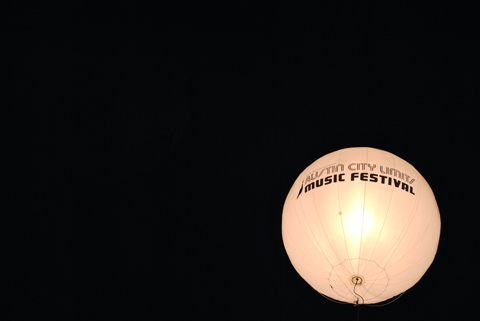


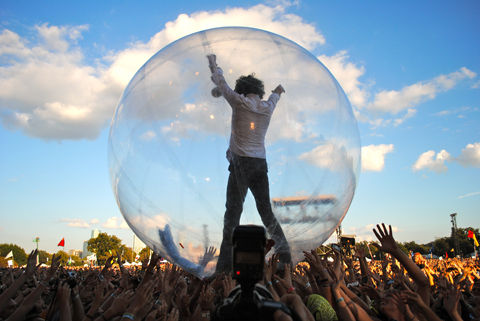
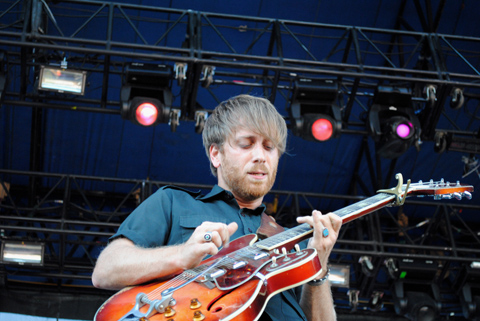

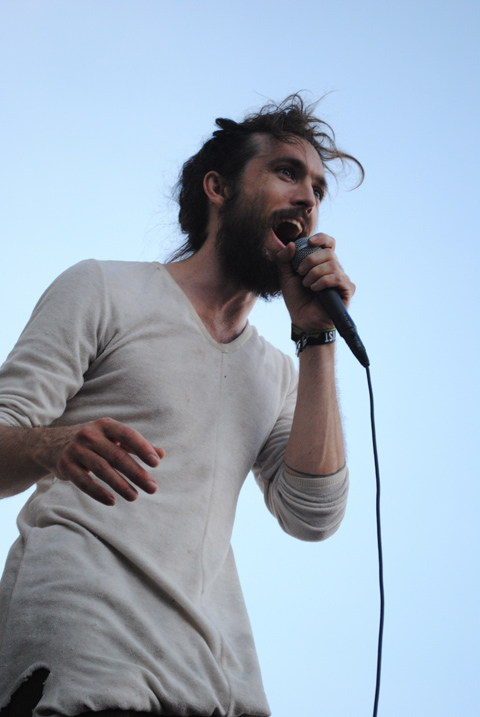

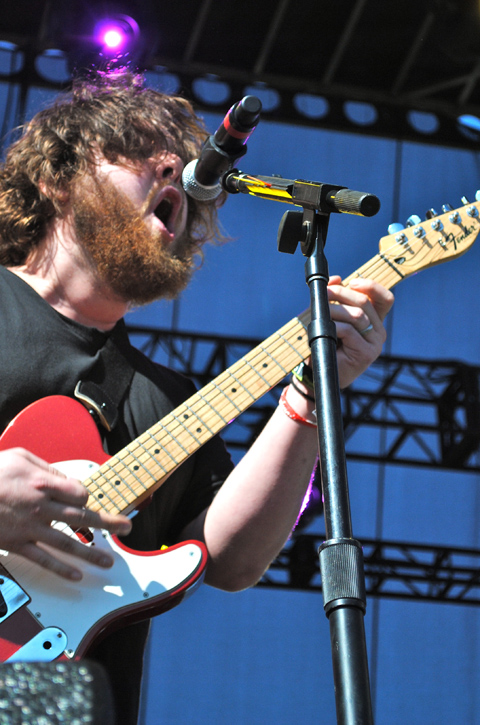
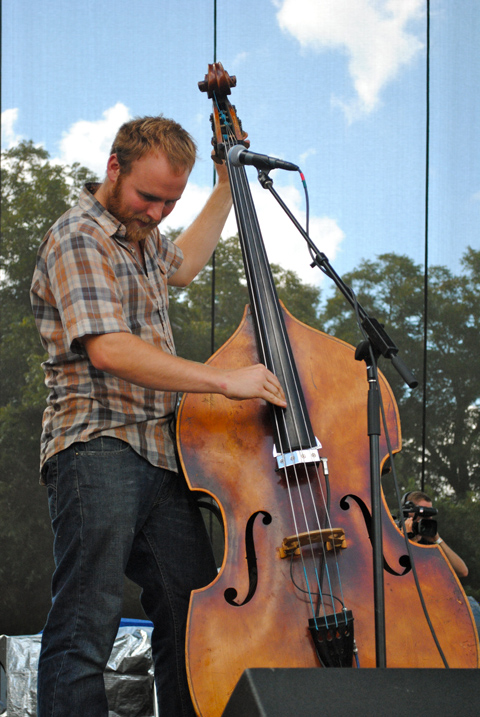
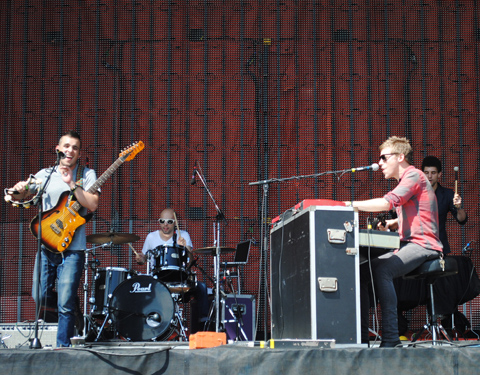
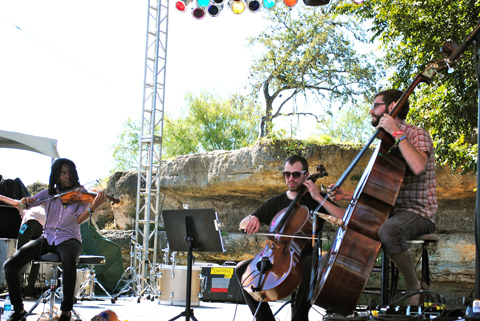
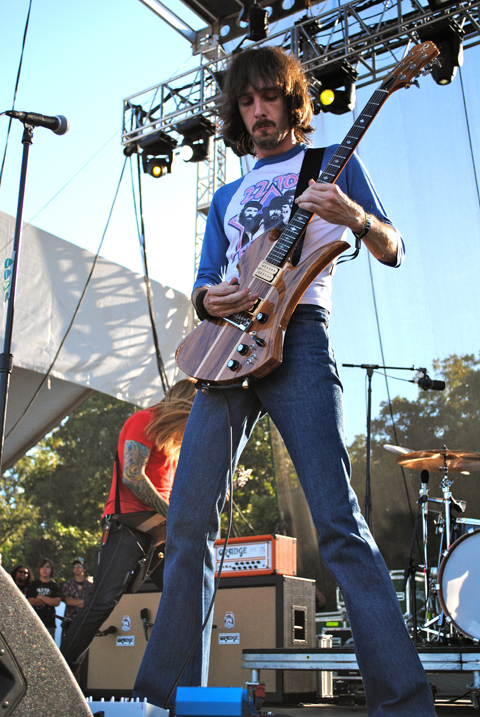

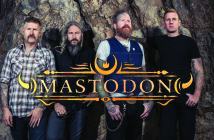
8 Comments
Great article — and I agree that The Eagles was an interesting choice for the final headliner, especially folllowing a lot more high-energy groups. Also, love the shot of the Flaming Lips “space bubble” — that’s a pretty great picture taken with a borrowed camera in one hand and $7 beer in the other.
Great article, and I loved the photos. Made me want to go to ACL!
I love Wayne’s space bubble!
Yelling “Thundercats, HOOOOOOOO!” with 30,000 strangers was one of the greatest moments of my life. Balmorhea put on a really beautiful show, too.
I WILL attend ACL next year. It sounds like it was amazing! Muse, The Black Keys, Edward Sharpe and the Magnetic Zeros, and White Rabbits are some of my all time favorite bands and to have them preforming at the same place on the same weekend is a dream come true. And Austin is the perfect place to have a music festival with all the free spirits roaming around and the overall artsy-fartsy aura of the town… So, in short, that was a sad weekend for me, it seems the ACL was a huge sucess. But like I said, I’ll be at the next one for sure.
Good pictures by the way 🙂
If Carmen goes I goes — unless you don’t want to be embarasses by my cogerhood.
Thundercats! Really?! So sad I missed it 🙁
We missed you and wanted to share this with you from 2011:
http://youtu.be/sI0YJCMUoPo